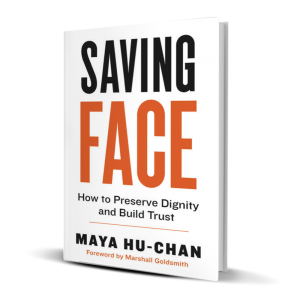 There’s an old Chinese proverb, “Spilled water is hard to regain.” Think about it. You accidentally knock a glass of water off the table and it spills all over the floor. If you wanted to get all that water back into the glass, how would you do it? Nearly impossible, right? And even if you managed to get all the spilled water back into the glass, would you still want to drink it? Yuck, me either. The point is, that the yuck factor is the same when we’re talking about the concept of face.
There’s an old Chinese proverb, “Spilled water is hard to regain.” Think about it. You accidentally knock a glass of water off the table and it spills all over the floor. If you wanted to get all that water back into the glass, how would you do it? Nearly impossible, right? And even if you managed to get all the spilled water back into the glass, would you still want to drink it? Yuck, me either. The point is, that the yuck factor is the same when we’re talking about the concept of face.
So what is face? Face represents a person’s self-esteem, self-worth, identity, reputation, status, pride, and dignity. When you experience conflicts, problems with relationships, resistance, poor performance or lack of motivation, it usually has something to do with face. When you hear someone says, “It’s not about the money,” the real issue is often about face.
Now, you can cause someone to lose face by giving negative feedback in public, challenging or disagreeing with someone, failing to acknowledge proper hierarchy, ignoring or interrupting someone, making insensitive jokes, et cetera. Sometimes you can never regain face once it’s lost. But in most cases, face can be restored.
A few years ago, I coached an executive named John. John was having difficulties with his colleagues. His feedback showed that as the global chief procurement officer, he was skillful with his negotiation skills with vendors and he was able to save the company millions of dollars. However, his colleagues found him difficult to work with. They said that John would dismiss their ideas or answer their request with a simple no, with no explanations, which made them feel disrespected and a loss of face. He came off as negative and arrogant. At first, John resisted the feedback, arguing that he knew the job so well it was a waste of time to explain himself to his colleagues. In his mind, it was his job to cut off bad ideas quickly, no explanation needed. “Wait a minute,” I ask, “are your co-workers your enemies?” “Well, they’re annoying,” was his answer.
Over time, the collaboration between his team and other teams got worse. It negatively impacted the business. John realized he needs to repair the relationship. During our coaching session, John shared that he was a big fan of kung fu novels. He saw a correlation between his work and how ancient warriors dealt with their own challenges. Perhaps subconsciously, he treated his peers like they were enemies, instead of partners. Now once I understood John’s outlook on his work, I incorporated his interests in a way that he could turn things around.
1. Face the feedback. “To know oneself is to study oneself in action with another person,” said Bruce Lee. So I told John that it takes courage to accept the feedback, and that he would be better off in the end. He began to see the damage he had done by treating the co-workers as opponents and causing them to lose face. Expanding the kung fu novel analogy, he realized that his ruthless efficiency was actually creating more enemies. He didn’t need to change his work ethics and loyalty to the company, but he needs to change his mindset and communication style.
2. Own your mistakes. Bruce Lee said, “Mistakes are always forgivable, if one has the courage to admit them.” John met with his co-workers. He thanked them for their honesty and told them he had a plan to improve. “From now on, I won’t say no immediately,” he promised. “We’re partners on the same team. I’m going to listen, ask questions, and work together to come up with win-win solutions.”
3. Pick a new habit and practice it constantly. “To hell with circumstances, I create opportunities,” said Bruce Lee. Changing behavior requires daily practice. John keeps his goal in mind in every interaction, so that the new habit will take root. He faced a big test when a manager asked him to do something he felt was unreasonable. Instead of immediately saying no, he took a breath. “Let me explain why it can’t be done,” he said, and then offered an alternative solution. He made a point to smile and even cracked a joke. His co-workers were surprised and pleased, and happy to accept his alternate plan. Over time, people began to notice him becoming more respectful and collaborative. To his surprise, his new attitude spread to his team as well.
In summary, here are three tips to preserve face and dignity and cultivate positive relationships:
1. Have the courage and humility to accept your shortcomings.
2. Have the emotional intelligence to save face for everyone involved.
3. Have the discipline to work towards positive change.
 My book, Saving Face illustrates how we can honor face to create positive first impressions, avoid causing others to lose face, and, most importantly, help others save face to build trust and lasting relationships inside and outside the workplace.
My book, Saving Face illustrates how we can honor face to create positive first impressions, avoid causing others to lose face, and, most importantly, help others save face to build trust and lasting relationships inside and outside the workplace.
Click here to watch the video.
This video was originally posted on AthenaOnline.com

